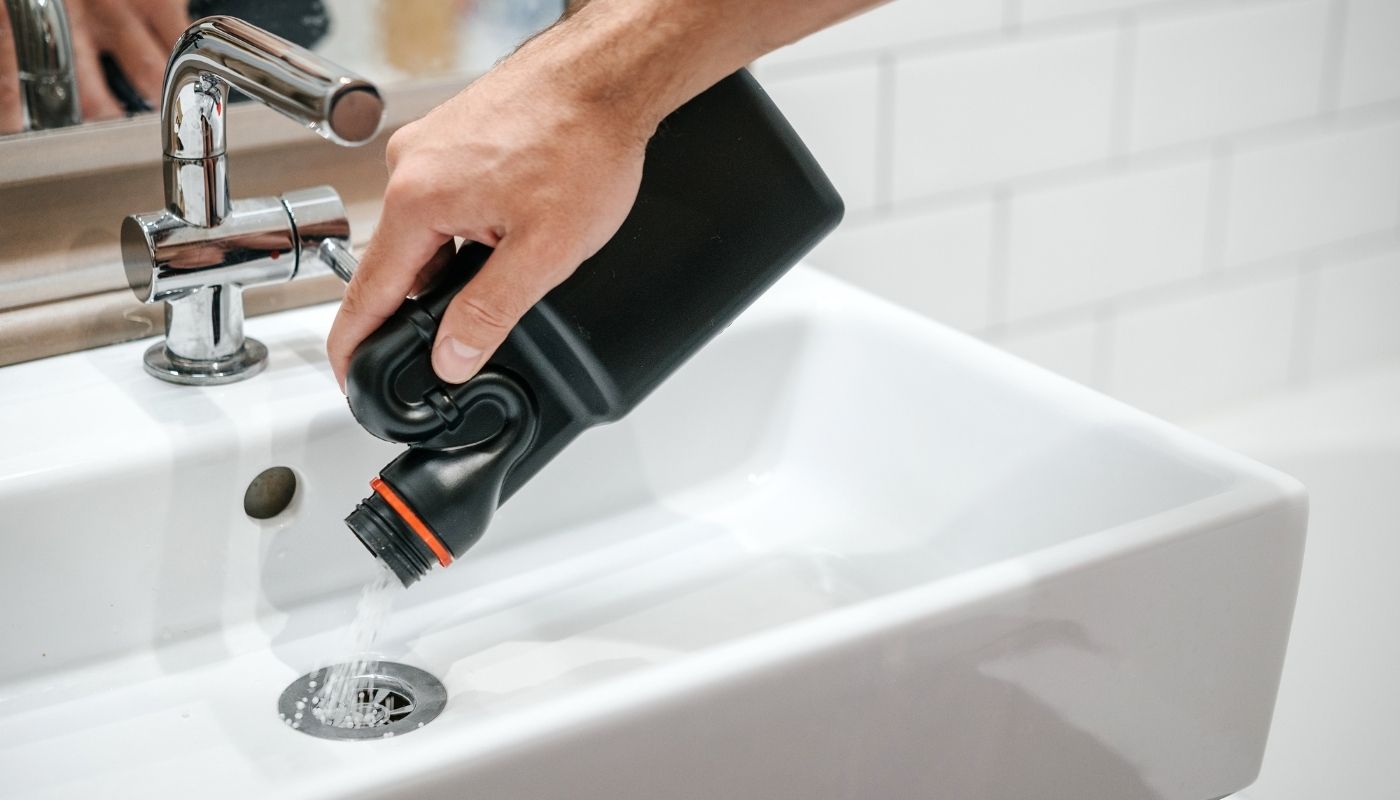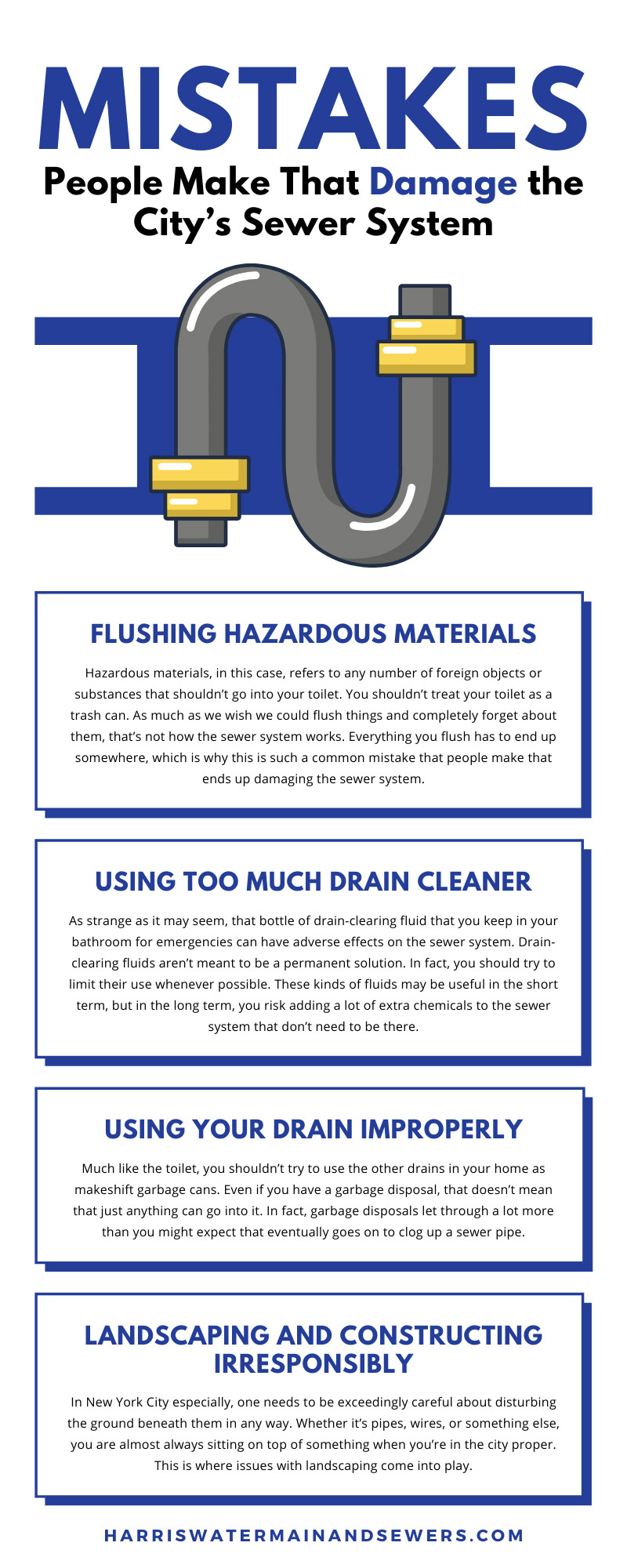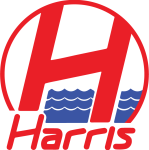When you live in a place like New York City, where everything and everyone is in such close proximity, you start to gain an appreciation for the effect that you have on others. Everything an individual does affects many more people than that person might believe at first. Even small decisions can have a big impact on your surroundings without your even realizing it. This might seem like an odd topic to bring up here, but when we apply it to our area of expertise, we can see it start to make sense.
The decisions that others make can affect utilities, like the water that flows to each individual’s place of residence. New York City’s water and sewer system is one of the largest and most complex systems in the world, so we need to consider how our decisions can upset the balance that we work so hard to maintain. There are many mistakes people make that damage the city’s sewer system and make everything worse for the people around them—and sometimes, people don’t realize what they did at all. Watch out for some of these mistakes so you don’t make them yourself.
Flushing Hazardous Materials
Hazardous materials, in this case, refers to any number of foreign objects or substances that shouldn’t go into your toilet. You shouldn’t treat your toilet as a trash can. As much as we wish we could flush things and completely forget about them, that’s not how the sewer system works. Everything you flush has to end up somewhere, which is why this is such a common mistake that people make that ends up damaging the sewer system.
Some common items that people flush that they shouldn’t are feminine hygiene products, food products, and sanitary wipes. We need to make a special aside for sanitary wipes, as they’ve become very popular recently and cause a lot of problems.
Many sanitary wipes boast that they are “flushable” on their packaging. This is a bit of a misnomer. A sanitary wipe being “flushable” often simply means that it has the ability to go down a toilet’s drain. However, that doesn’t mean the wipe will break down in the same way that toilet paper does. In recent years, many sewer pipes became clogged up with these sanitary wipes and needed major repairs to get back in order. It may not seem like a big deal to flush these things, but when enough people do it, the problem compounds itself and becomes a disaster very quickly.
Using Too Much Drain Cleaner
As strange as it may seem, that bottle of drain-clearing fluid that you keep in your bathroom for emergencies can have adverse effects on the sewer system. Drain-clearing fluids aren’t meant to be a permanent solution. In fact, you should try to limit their use whenever possible. These kinds of fluids may be useful in the short term, but in the long term, you risk adding a lot of extra chemicals to the sewer system that don’t need to be there.
These fluids can eventually start to eat away at piping, causing leaks and breaks in the system. They also create more work for the water treatment facilities, as the fluids can be difficult to break down. If you find yourself using drain-clearing liquids more often than you think you should, it’s a good idea to call a local plumber to come to help you identify your real problem. They’ll be able to tell you how to fix the root issue so you can avoid having to use those drain-clearing fluids so much and harming your pipes and the sewer system.
Using Your Drain Improperly
Much like the toilet, you shouldn’t try to use the other drains in your home as makeshift garbage cans. Even if you have a garbage disposal, that doesn’t mean that just anything can go into it. In fact, garbage disposals let through a lot more than you might expect that eventually goes on to clog up a sewer pipe.
Another problem that doesn’t seem like a big deal when only one person does it is throwing old cooking grease and oil down your kitchen drain. This is much more common than you think, and there are huge issues with this practice. Cooking grease and oils are fats, meaning they don’t simply break down when they get into water. What tends to happen is that this grease and oil collects on the sides of pipes and eventually hardens, creating an ever-expanding mass of fat.
The sanitary wipes that we mentioned earlier can exacerbate this problem immensely, as they can get stuck to these masses of fat, eventually completely blocking a pipe. These blockages are colloquially known as “fatbergs,” and they pose a serious problem to the health and safety of New Yorkers everywhere.
While you want to avoid sending these things down your drain for the sake of your own home’s plumbing, you should also consider the effect that this decision can have on your neighbors as well.
Landscaping and Constructing Irresponsibly
In New York City especially, one needs to be exceedingly careful about disturbing the ground beneath them in any way. Whether it’s pipes, wires, or something else, you are almost always sitting on top of something when you’re in the city proper. This is where issues with landscaping come into play.
Far too often, workers can cause serious damage to the city’s sewer system by being irresponsible with construction and landscaping work. Not knowing where pipes are and damaging them by accident happens more often than you might think. This leads to major repairs that can inconvenience a lot of people for a long time. In the worst-case scenarios, entire sewer lines need replacing, causing further problems for everyone nearby.
Sewer line replacement companies like us here at Harris Main and Water Sewer Contractors want to ensure that everyone in New York City has the water and sewer services that they need to continue living safe and healthy lives. When the city needs fast, efficient, and trustworthy work done on their sewer lines and water mains, Harris is the name they trust to get the job done right.






















